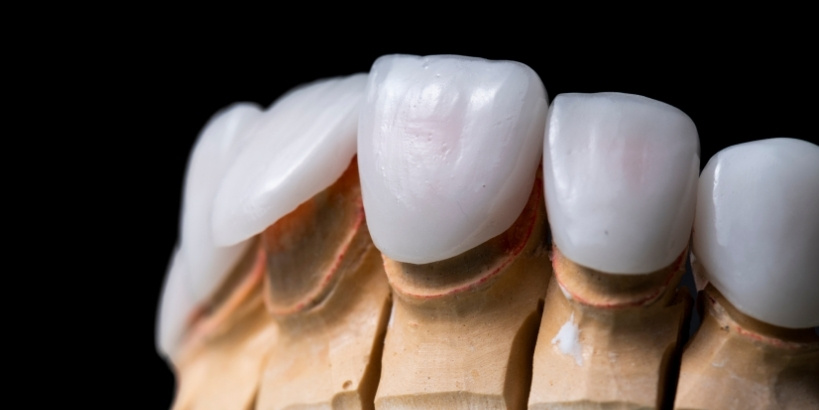4765 Carmel Mountain Rd., Suite 203, San Diego, CA 92130
What to Eat and Avoid After Getting Veneers?: A Guide to Diet and Care

What to Eat and Avoid After Getting Veneers?: A Guide to Diet and Care
Dental veneers are thin shells placed over the front of teeth to enhance their appearance. They can help with issues like discoloration, gaps, and damage. Caring for these custom-made shells is essential to maintain their appearance and longevity. One of the most effective ways to protect your veneers is through diet. What you eat—and avoid—can make a big difference in the health of your teeth and the lifespan of your veneers.
This guide will explore what foods you should eat and which ones you should avoid after getting these solutions.
Understanding Dental Veneers
Veneers are typically made from porcelain or composite resin and are custom-designed to fit over your natural teeth. The process involves removing a small enamel layer from the tooth’s surface before bonding the veneer. This makes the tooth appear whiter, smoother, and more uniform.
Porcelain options are highly durable, resistant to staining, and mimic the look of natural teeth, making them an ideal choice for many. However, they can be more fragile than your natural enamel, so it’s essential to take extra care to avoid damaging them.
After getting these customized shells, it’s normal to experience some tooth sensitivity, especially to hot or cold foods. Over time, your teeth may adjust to the veneers, but you should be cautious during the initial period. Certain foods and habits may also cause damage to these shells, leading to chips, cracks, or loosening. Proper care, including a mindful diet, is key to ensuring your veneers remain in great condition.
What to Eat After Getting Veneers?
Soft and Easy-to-Chew Foods
After getting veneers, it is important to avoid chewing hard foods in the first few days. Opt for soft foods like mashed potatoes, yogurt, smoothies, scrambled eggs, and soups. These foods are gentle on your veneers and help prevent any pressure that could cause damage.
Nutrient-Rich Foods for Oral Health
Nutrient-rich foods promote healthy gums and oral health, which are essential after getting these solutions. These foods include leafy greens, fruits, whole grains, and lean proteins like chicken or tofu. They provide the necessary vitamins and minerals to aid in healing and keep your gums strong, which helps support the longevity of your veneers.
Hydrating Foods and Drinks
Keeping hydrated is key to overall oral health. Water is always the best choice, but you can enjoy non-citrus juices and herbal teas. Staying hydrated helps prevent dry mouth, which can lead to plaque buildup and gum issues. Additionally, these drinks are less likely to stain these shells compared to sugary or acidic beverages.
Foods to Avoid After Getting Veneers
Hard, Crunchy, and Sticky Foods
After getting these shells, avoid foods like nuts, raw carrots, caramel, and taffy. These foods require a lot of force to chew, which can damage the veneers, causing them to crack or loosen. Sticky foods, such as chewy candies, can also pull at the edges of the veneers, making them more prone to damage.
Foods and Drinks That Can Stain Veneers
Certain foods and drinks can stain your veneers, affecting their bright, white appearance. Coffee, tea, red wine, berries, and tomato-based sauces are known for causing stains. To reduce staining, you can use a straw when drinking staining liquids, rinse your mouth with water afterward, or brush your teeth shortly after consumption.
Acidic Foods and Beverages
Citrus fruits, soda, and vinegar-based dressings are acidic foods that can weaken the adhesive bond that holds your veneers in place and wear down the surface of these shells over time. It is best to limit these foods or rinse your mouth thoroughly after eating or drinking them.
General Care Tips for Your Veneers
Maintaining Proper Oral Hygiene
To keep your veneers looking their best, brush your teeth at least twice daily with a soft-bristled toothbrush and non-abrasive toothpaste. Regular flossing is equally important to prevent plaque buildup around these shells and along the gumline. Visit your dentist regularly for checkups and cleanings to keep everything in good condition.
Avoiding Habits That Can Damage Veneers
Habits like teeth grinding, using your teeth as tools, or biting down on hard objects can cause significant damage to your veneers. Avoid opening packages, bottles, or other items with your teeth, as this can chip or crack these shells.
Monitoring for Any Signs of Damage
Check your veneers regularly for signs of wear. Look for chips, cracks, or loosening, and contact your dentist immediately if you notice any damage. Early intervention can prevent further issues and extend the life of these shells.
Caring for your veneers is essential to ensure they remain beautiful and functional for many years. After getting these shells, it’s important to be mindful of your diet. Focus on soft, nutrient-rich, and hydrating foods while avoiding hard, sticky, and acidic items that could damage your veneers. Maintain good oral hygiene, avoid harmful habits, and monitor for any signs of damage.
By following these guidelines, you can protect your investment in your smile and enjoy long-lasting results. Don’t forget to consult with our dentists for personalized advice based on your specific needs.

